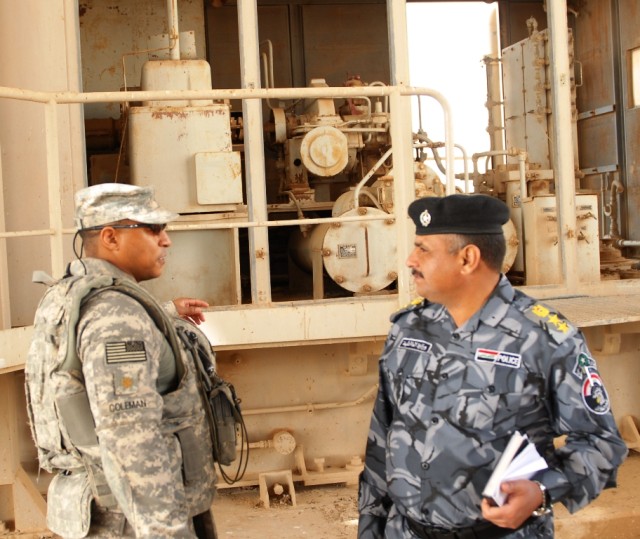Though the U.S. has been building up the civilian infrastructure of Iraq since 2003, the sense of ownership and level interest of the people has never been as great as it is now, and that makes all the difference.
For Lt. Col. Paul Schmidt, a civil affairs officer with 1st Infantry Division, the change over the years has been noticeable.
"My last tour ended just as the surge was beginning in late 2006 so the change is primarily in the atmosphere," he said "There are still the same great, courageous people to work with, but I sense a much greater feeling of pride and hope for the future now than before."
That pride is being demonstrated in the expectations of the people.
"This country is becoming more and more stable because the Iraqi people are demanding it now in greater numbers," he said.
And that demand is being met by the local government and Iraqi Security Forces in the provinces overseen by United States Division-South, of which 1st Infantry Division is the headquarters.
"We are really at a point where stability operations and building civil capacity is extremely important," Schmidt said. "Local government officials are very effective across the USD-S AO [area of operations], but with increasing stability and effectiveness of ISF, we can really make great progress in assisting the Iraqis with providing services to the people and solving problems."
In order to achieve that progress, USD-S and the U.S. Department of State's Provincial Reconstruction Teams are working together to build effective relationships that not only thrive and mature, but thoroughly benefit the country of Iraq.
"The State Department is the lead for building civil capacity, but they are not resourced to do everything we need to accomplish, so it is accomplished through a partnership between DoS and DoD," Schmidt said. "They provide leadership of the PRTs as well as subject matter experts in governance, economic development, rule of law, agriculture and others, and we provide them the ability to move safely in order to perform their critical functions with Iraqi officials."
The cooperation between U.S. civilian and military elements is crucial, Schmidt said.
"The relationship is important and based on strong communication," he said. "I think we do a good job capitalizing on the strengths of each organization in order to maximize and synchronize our efforts to assist the Iraqis in building capacity for themselves."
As Iraq has stabilized, the work done in the civilian sector has moved to the forefront, and everyone is getting involved.
"With increased stability and security, the civil affairs mission becomes more important," Schmidt said. "This doesn't mean the civil affairs forces have to be the only units doing civil-military operations; just the opposite is true. U.S. forces at all levels have become very effective in conducting those missions so CA forces are being withdrawn from Iraq, with the exception of small planning teams at brigade and above."
This civil affairs work includes the promotion of long-term stability, development of sound and responsive democratic institutions, development of a supportive infrastructure and promotion of a strong free-market economy, as well as civil information management in order to share details on every aspect of the relationship between civilians and military elements.
In addition, Soldiers are involved with programs to assist with governance, rule of law and essential services, often helping Iraqi officials develop projects to improve those areas. CA teams even act as civil liaisons between the Iraqi officials and military commanders, and provide the same service to a wide variety of non-governmental and international organizations.
With troops being pulled out of Iraq and the stability of the country in the hands of the Iraqi government, the liaisons from U.S. civil affairs teams are playing a vital role in creating a working society.
"Civil affairs Soldiers made a great impact in Japan and Germany throughout and following WWII and the same is happening now in Iraq and Afghanistan," Schmidt said.






Social Sharing